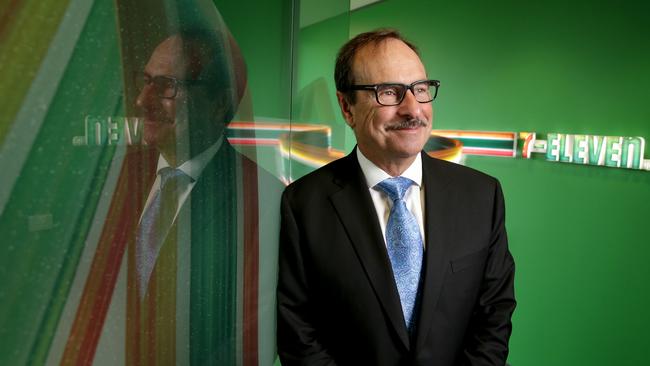7-Eleven’s huge profits revealed
A rare look at the financial accounts for 7-Eleven has revealed the convenience chain is making huge profits.

Profits are surging at the country’s largest convenience store, 7-Eleven, and its billionaire owners are receiving huge dividends as the business continues its recovery from its 2015 wages scandal.
Financial accounts for 7 Holdings, the parent company owned by billionaire Russell Withers and his family, recently lodged with the corporate regulator for the first time in the group’s 40-year history and obtained by The Australian, show profits trebling and annual revenue hitting the $3.4 billion mark.
The accounts revealed 7-Eleven’s pre-tax profit for the 2018 financial year, the most recent available and lodged only a few days ago, surged to $119.6 million compared with $37.4m the previous year. The $3.4bn revenue was up from $2.8bn in 2017 and, after paying $36m in tax, net profit was about $84m, compared with $28m in 2017.
Mr Withers, whose wealth was estimated at $2.09bn in late March on The List — Australia’s Richest 250, published by The Australian, and his family, including the family of his late sister Beverley Barlow, received dividends totalling $68m, including two special non-cash dividends of $10.3m each.
Management attributed the strong financial result to an increased focus on updated food and drink offerings, including 7-Eleven’s popular $1 coffee.
“Growth in merchandise sales has been underpinned by growing customer acceptance of 7-Eleven’s food-on-the-go offer, including coffee, fresh sandwiches and hot pastries,” the accounts said.
“Tobacco sales also increased during the year, predominantly driven by excise changes. Other favourable categories include carbonated drinks and juices.”
7-Eleven’s accounts had previously not been lodged with the Australian Securities & Investments Commission under grandfathering provisions stretching back to the 1990s. The 2018 financial report sheds light on the sheer size of the business for the first time under the “significant global entity” concept, where an entity has an income of $1bn or more.
The accounts also revealed 7-Eleven has paid more than $100m under its wages claim and repayment programs, introduced after the company was hit by a scandal in 2015 for systematically underpaying staff.
The company paid out about $15m in 2018.
The scandal saw Mr Withers leave the board, but he maintains his ownership stake.
The company is under the management of chief executive Angus McKay, recruited in 2016 to clean up 7-Eleven’s franchise relationships and staff systems. Its board is chaired by Michael Smith, a former chairman of the West Coast Eagles and iiNet.
Management had previously claimed it had spent $50m on new systems, IT and compliance and that its reputation with consumers was improving, though 7-Eleven was hit with a class action last year by franchisees who allege misleading and deceptive conduct.
The total number of 7-Eleven stores operated by third-party franchisees during the year decreased from 599 at the start of the 2018 financial year to 589, and the total number of stores operated by the Withers family’s Convenience Holdings as a franchisee during the year increased from 61 to 91.
7-Eleven is the largest convenience retailer on the eastern seaboard of Australia and claims to have a market share of about 38.5 per cent in the region.
It also claims to be the largest independent fuel retailer on the eastern seaboard, with more than 490 fuel stores selling Mobil-branded fuels.
The company said it had opened 34 new fuel stores during 2018 and was “improving its pump facings to diesel and premium fuel grades thereby capitalising on consumer trends towards these grades and the increased margin associated with these grades”.
7-Eleven’s accounts also revealed it had spent more than $69m on capital expenditure during the year and it had cash and cash equivalents of $75m.
Mr Withers and his family brought 7-Eleven to Australia in 1977, opening the first store in Melbourne’s Oakleigh. The company also brought the Starbucks coffee chain brand back to Australia in 2014.
Previously lodged accounts by Starbucks Australia show it made a $3.3m loss from $70m revenue in 2018 across 37 stores.
7-Eleven last August also bought a majority stake in Melbourne-based alcohol delivery start-up Tipple.




To join the conversation, please log in. Don't have an account? Register
Join the conversation, you are commenting as Logout